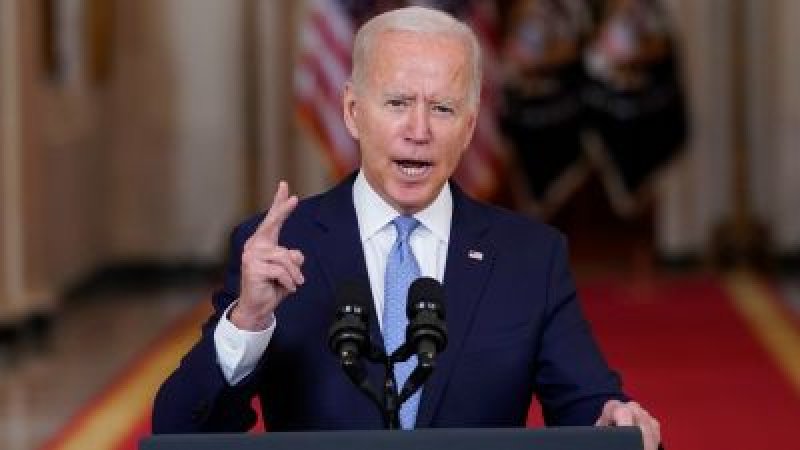A day after the United States flew its last soldier out of Afghanistan, ending the country’s 20-year presence there, US President Joe Biden defended his decision to withdraw troops and pointed to the actions of other players that led to a chaotic exit.
“I was not going to extend this forever war,” he said.
Speaking at the White House, Biden again blamed the former Afghan government and Afghan security forces for “handing over the country to their enemy, the Taliban,” and pointed to the previous administration reaching a deal with the Taliban on the withdrawal.
While he took responsibility for the decision, he added that the challenges faced during the withdrawal were unavoidable.
With the end of the Afghanistan war, Biden said, “we’ve got to learn from our mistakes.” Future deployments would have to have clear, achievable objectives, he stressed, and they would also have to focus “on fundamental national security interests of the US.”
Biden also used his Tuesday speech to send a warning to the branch of Islamic State terrorists in the area, ISIS-K, and let the 100 to 200 US citizens left in Afghanistan, by his account, know that the US government was still undertaking efforts to help them leave.
Although the US had begun planning its departure in 2020 after a deal between the Trump administration and the Taliban, when Biden carried on with the plan he had expected to hand control to a Western-backed government, not the Taliban militants the US had been fighting for two decades.
Taliban members are jubilant. Its forces have occupied the city’s airport, which had been the last haven of US control as Washington and its allies executed a desperate airlift operation for the last two weeks to get Westerners and their allies out of the country.
Taliban members guarding the airport now are virtually indistinguishable from the US troops who had guarded it up until Monday, having raided abandoned supplies and making use of uniforms and equipment left behind.
But the Pentagon was nonplussed about the abandoned weapons and munitions.
“We made sure to demilitarize, to make unusable, all the gear that is at the airport – all the aircraft, all the ground vehicles,” said spokesman John Kirby. “The only thing that we left operable are a couple of fire trucks and some forklifts, so that the airport itself can remain more operational going forward.”
“So I think we’re not overly concerned about these images of them walking around,” he said, referring to images circulating since the US departure of Taliban forces exploring the airport.
Reports of fighting had emerged on Tuesday from the one part of Afghanistan not under Taliban control, even as the fundamentalist group asserted its control in Kabul.
Panjir is the only district that was not taken in the Taliban’s offensive this month. Nor was it taken in 1996-2001, partially because the region is only accessible through a valley that is relatively easy to defend.
The Taliban made no comment. It has made relatively few assaults on Panjir even as it took over the rest of the country.
A high-level meeting of the Islamist group’s leadership council had taken place over the weekend, according to a Taliban spokesman.
Important consultations on the formation of a new Islamic government and cabinet were part of the discussions, he added, spurring speculation that the country’s new leadership will be unveiled soon.
Governments around the world are weighing how to deal with the Taliban. While the European Union is worrying about the impact of a new refugee surge, many of its member countries and the US say they are still going to talk to the Taliban about evacuating any citizens left in Afghanistan.
China, meanwhile, promised closer ties to Afghanistan and chided the US for trying to impose its own values on another nation.
The United Nations, for its part, said its humanitarian projects for Afghanistan would not change, regardless of the situation on the ground. The World Health Organization said an aid flight made it to Mazar-e Sharif and two more are planned in the coming days, with the planes expected to fly on to Kabul afterwards.
A spokesperson said the planes would bring supplies into Afghanistan, and also bring people out.
“The armies have left, but the UN stayed,” said Jens Laerke, a spokesperson for the UN’s Office for the Coordination of Humanitarian Affairs in Geneva, noting the need for medicine and food, as millions are internally displaced, with many heading to the country’s borders.
He said UN agencies are in contact with all groups exercising power in the country, which is necessary for its humanitarian operations.
In the wake of the US departure, Kabul residents reported calm in the Afghan capital on Tuesday.
“The city is quiet,” said Lotfullah, who lives in central Kabul. Most shops in the Shahr-e Nau district were open, but only have a few customers, he said.
A few banks reopened their largest branches on Tuesday, just more than two weeks after the Taliban reconquered the country, and hundreds of people stood in line to withdraw money.
In the streets, few members of the Taliban were in evidence. Most were guarding buildings, mainly government offices.

